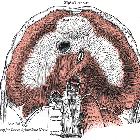Lungensegmente




Bronchopulmonary segmental anatomy describes the division of the lungs into segments based on the tertiary or segmental bronchi.
Gross anatomy
The trachea divides at the carina forming the left and right main stem bronchi which enter the lung substance to divide further. This initial division is into secondary or lobar bronchi, but subsequent divisions give rise to smaller and smaller bronchi and bronchioles until the smallest bronchioles connect to the innumerable alveoli.
Each segment has its own pulmonary arterial branch and thus, the bronchopulmonary segment is a portion of lung supplied by its own bronchus and artery. Each segment is functionally and anatomically discrete allowing a single segment to be surgically resected without affecting its neighboring segments.
There is some form of segmental symmetry between the right and left lungs, even though the left lung is smaller and only contains two lobes. In general, each lung has 10 segments: the upper lobes contains 3 segments, the middle lobe / lingula 2 and the lower lobes 5. Bilaterally, the upper lobes have apical, posterior and anterior segments and the lower lobes superior (apical) and 4 basal segments (anterior, medial, posterior and lateral). With this basic symmetric anatomy shared between the lungs, there are a few differences that can be described:
- the middle lobe on the right has 2 segments: medial and lateral (easy to remember - middle lobe, medial and lateral).
- the lingula on the left is part of the left upper lobe and is the equivalent of the middle lobe on the right, and hence it has 2 segments, but in this case, it is divided into superior and inferior segments.
- there are 2 regions of the left lung in which 2 segments are joined as 1 as they have a common tertiary (segmental) bronchus:
Right lung
The right lung is subdivided into three lobes with ten segments. The notation in brackets refers to the Boyden classification of bronchi.
- right upper lobe
- apical segment (B1)
- posterior segment (B2)
- anterior segment (B3)
- right middle lobe (or more correctly - just middle lobe)
- lateral segment (B4)
- medial segment (B5)
- right lower lobe
- superior segment (B6)
- medial segment (B7)
- anterior segment (B8)
- lateral segment (B9)
- posterior segment (B10)
Left lung
The left lung is subdivided into two lobes and thereby, into eight segments. The notation in brackets refers to the Boyden classification of bronchi.
- left upper lobe
- apicoposterior segment (B1/2)
- anterior segment (B3)
- superior lingular segment (B4)
- inferior lingular segment (B5)
- left lower lobe
- superior segment (B6)
- anteromedial segment (B7/8)
- lateral segment (B9)
- posterior segment (B10)
Useful mnemonic to remember the bronchopulmonary segments are:
- A PALM Seed Makes Another Little Palm (right lung)
- ASIA ALPS (left lung)
Variant anatomy
Siehe auch:
- Pleura
- Zwerchfell
- left upper lobe apicoposterior segment
- Lunge
- parenchyma
- Mittellappen
- lung parenchyma
- linker Oberlappen
- Thorax Onlinekurs
- pulmonary opacity
- linker Unterlappen
- rechter Unterlappen
- rechter Oberlappen
- Lungenazinus
- right lung
- left lung
- apical segment
und weiter:

 Assoziationen und Differentialdiagnosen zu bronchopulmonary segments:
Assoziationen und Differentialdiagnosen zu bronchopulmonary segments:




